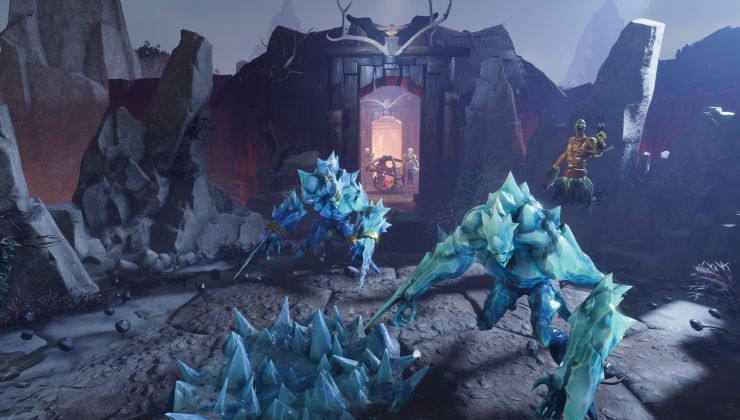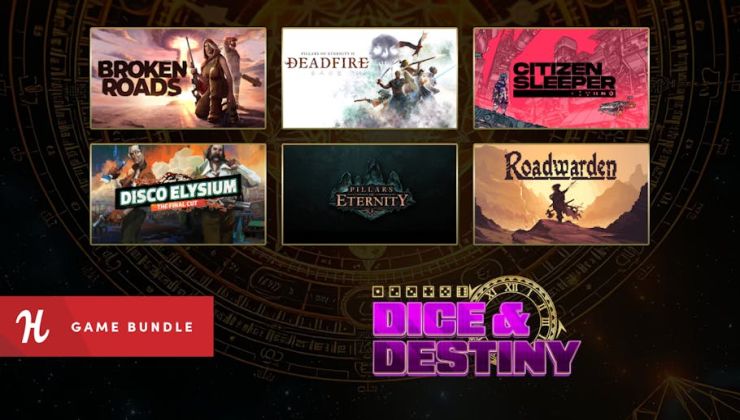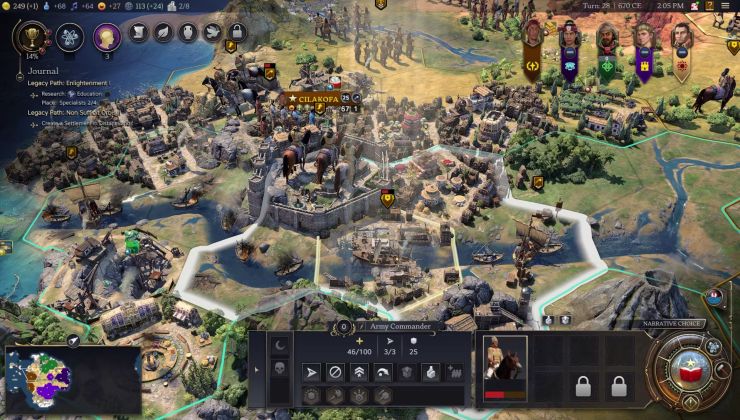Valve have once again gathered all the new features and fixes from a bunch of recent Beta builds and pushed it out to everyone, this includes a bunch of nice fixes for Linux.
Steam Remote Play is one of the biggest changes (previously in-home streaming), now it's "experimentally" available outside the home too with the renaming. You should now be able to stream games from one Steam client to another, wherever they are.
On the Linux side the fixes include: a random Steam client crash when launching games, a bug where copying/moving files bigger than 2GB would fail with an I/O error, improved responsiveness to network changes, support for rumble pass-through for virtual controllers (rumble for the Steam Controller), prefer Steam Runtime's libcurl over yours which fixes "Risk of Rain" and other GameMaker titles, support for removing old Proton versions by aliasing them to more recent ones and support for developers and Valve testing specifying default Proton configuration options for games even if they're not yet white-listed.
Their Shader Pre-Caching was re-worked, to enable downloading and pre-compiling of the whole collection of Vulkan pipelines for a given game. You will likely now see them show up in the Steam client downloads area with an OpenGL/Vulkan logo below them. Valve said "Pre-compiling" will be enabled in a future Steam update. This is the feature that should, eventually, help stop stuttering in games when you first play them. They also fixed an issue with them being downloaded, even if the feature was disabled by you.
There's plenty more fixes in this update, like issues with the in-game overlay becoming "abnormally pixelated" for games using Vulkan, plenty of Steam Input updates and so on.
Full news here.
As a reminder, the Steam Library overhaul is also getting a public beta soon.
For Linux (& Mac) gamers, that would mean all those games currently not playable on Linux, the 40% or so of Steam that isn't quite there yet with Proton, would suddenly immediately become playable via an alternative solution, ie: streaming from a Valve server. Effectively bringing all Steam games to Linux.Except if their internal backend would run Linux, just like Stadia – which may as well be the case they are spending so much time on Linux, either SteamBox2 or both, hm…
All Valve has to do now is offer some kind of option to run your own remote instance of a gaming PC on a Valve server, and connect direct to it, and they'll have an alternative to Stadia. Buy your game on Steam, download it to play it locally, or stream it to any PC or phone/tablet or TV. Stream it from your PC or stream it from a Valve server. All your workshop mods, your cloud saves, your Steam friends, etc, take them all with you anywhere you go.
Buy Portal 2 and download/install it locally to play on your PC, then stream it from your PC to your TV and play it with any controller you want, then stream it from a Valve server to your phone and play it on the train.
If Valve offered that service for free, (which they probably could because the overwhelming majority of users would prefer local gaming so it wouldn't be a commonly used option), Stadia would be dead on arrival.
For Linux (& Mac) gamers, that would mean all those games currently not playable on Linux, the 40% or so of Steam that isn't quite there yet with Proton, would suddenly immediately become playable via an alternative solution, ie: streaming from a Valve server. Effectively bringing all Steam games to Linux.
Boom, no need to ever install Windows for any game on Steam. No need to buy games on Google's or iOS's app store even, just buy it on Steam and stream it to your phone!
I'm calling it, this is what Valve is working towards. Valve is going to make it happen.
They would also have to invest a number of billions in new datacenters and bandwidth for that to happen on the scale that Valve operates (they have roughly 90 million monthly users) and they would have to build them locally all over the world. The costs of running stuff like this is extreme and is why currently only Google is pulling it off (and we don't know yet if they will pull it off).
The other services described in this thread is nowhere near to compete, Shadow seams to have only a small number of servers in California and Geforce Now seams to have only 300k users with some reports that performance is bad during peak hours (but to be honest I have just spent a few minutes googling this).
For what it's worth I worked as the CTO of a Cloud computing startup 11 years ago and had to design stuff like this.
I have an Nvidia Shield. GeForce Now has a small set of free games included with the service, as standalone games and managed by Nvidia, but and this is where it's getting interresting, you may run Steam, Origin, Uplay and/or Epic launchers inside GeForce Now to play any games in your personnal library on Nvidia's servers (remote computer). Each instances are powered by a Tesla P40 GPU and graphical options are preset for each officially supported games. Still, no problems running games at ultra for the other games, as far as I witnessed.
Imo, it would be the ideal services if it ran on Linux instances, but I don't think it's what they do.
Last edited by Mohandevir on 17 Jun 2019 at 7:32 pm UTC
All Valve has to do now is offer some kind of option to run your own remote instance of a gaming PC on a Valve server, and connect direct to it, and they'll have an alternative to Stadia. Buy your game on Steam, download it to play it locally, or stream it to any PC or phone/tablet or TV. Stream it from your PC or stream it from a Valve server. All your workshop mods, your cloud saves, your Steam friends, etc, take them all with you anywhere you go.
Buy Portal 2 and download/install it locally to play on your PC, then stream it from your PC to your TV and play it with any controller you want, then stream it from a Valve server to your phone and play it on the train.
If Valve offered that service for free, (which they probably could because the overwhelming majority of users would prefer local gaming so it wouldn't be a commonly used option), Stadia would be dead on arrival.
For Linux (& Mac) gamers, that would mean all those games currently not playable on Linux, the 40% or so of Steam that isn't quite there yet with Proton, would suddenly immediately become playable via an alternative solution, ie: streaming from a Valve server. Effectively bringing all Steam games to Linux.
Boom, no need to ever install Windows for any game on Steam. No need to buy games on Google's or iOS's app store even, just buy it on Steam and stream it to your phone!
I'm calling it, this is what Valve is working towards. Valve is going to make it happen.
They would also have to invest a number of billions in new datacenters and bandwidth for that to happen on the scale that Valve operates (they have roughly 90 million monthly users) and they would have to build them locally all over the world. The costs of running stuff like this is extreme and is why currently only Google is pulling it off (and we don't know yet if they will pull it off).
The other services described in this thread is nowhere near to compete, Shadow seams to have only a small number of servers in California and Geforce Now seams to have only 300k users with some reports that performance is bad during peak hours (but to be honest I have just spent a few minutes googling this).
For what it's worth I worked as the CTO of a Cloud computing startup 11 years ago and had to design stuff like this.
I have an Nvidia Shield. GeForce Now has a small set of free games included with the service, as standalone games and managed by Nvidia, but and this is where it's getting interresting, you may run Steam, Origin, Uplay and/or Epic launchers inside GeForce Now to play any games in your personnal library on Nvidia's servers (remote computer). Each instances are powered by a Tesla P40 GPU and grapical options are preset for each officially supported games. Stil, no problems running games at ultra for the other games, as far as I witnessed.
Imo, it would be the ideal services if it ran on Linux instances, but I don't think it's what they do.
Thanks for the info! Do you know if the GPU shared or dedicated?
All Valve has to do now is offer some kind of option to run your own remote instance of a gaming PC on a Valve server, and connect direct to it, and they'll have an alternative to Stadia. Buy your game on Steam, download it to play it locally, or stream it to any PC or phone/tablet or TV. Stream it from your PC or stream it from a Valve server. All your workshop mods, your cloud saves, your Steam friends, etc, take them all with you anywhere you go.
Buy Portal 2 and download/install it locally to play on your PC, then stream it from your PC to your TV and play it with any controller you want, then stream it from a Valve server to your phone and play it on the train.
If Valve offered that service for free, (which they probably could because the overwhelming majority of users would prefer local gaming so it wouldn't be a commonly used option), Stadia would be dead on arrival.
For Linux (& Mac) gamers, that would mean all those games currently not playable on Linux, the 40% or so of Steam that isn't quite there yet with Proton, would suddenly immediately become playable via an alternative solution, ie: streaming from a Valve server. Effectively bringing all Steam games to Linux.
Boom, no need to ever install Windows for any game on Steam. No need to buy games on Google's or iOS's app store even, just buy it on Steam and stream it to your phone!
I'm calling it, this is what Valve is working towards. Valve is going to make it happen.
They would also have to invest a number of billions in new datacenters and bandwidth for that to happen on the scale that Valve operates (they have roughly 90 million monthly users) and they would have to build them locally all over the world. The costs of running stuff like this is extreme and is why currently only Google is pulling it off (and we don't know yet if they will pull it off).
The other services described in this thread is nowhere near to compete, Shadow seams to have only a small number of servers in California and Geforce Now seams to have only 300k users with some reports that performance is bad during peak hours (but to be honest I have just spent a few minutes googling this).
For what it's worth I worked as the CTO of a Cloud computing startup 11 years ago and had to design stuff like this.
I have an Nvidia Shield. GeForce Now has a small set of free games included with the service, as standalone games and managed by Nvidia, but and this is where it's getting interresting, you may run Steam, Origin, Uplay and/or Epic launchers inside GeForce Now to play any games in your personnal library on Nvidia's servers (remote computer). Each instances are powered by a Tesla P40 GPU and grapical options are preset for each officially supported games. Stil, no problems running games at ultra for the other games, as far as I witnessed.
Imo, it would be the ideal services if it ran on Linux instances, but I don't think it's what they do.
Thanks for the info! Do you know if the GPU shared or dedicated?
Sorry. I have absolutely no clue on this one.
Edit: All I know is that it's based on the former Nvidia Grid technology, so I suspect it might be shared with some form of "load balancing". Is it the good expression when it comes to GPU workloads?
Last edited by Mohandevir on 17 Jun 2019 at 7:30 pm UTC
All Valve has to do now is offer some kind of option to run your own remote instance of a gaming PC on a Valve server, and connect direct to it, and they'll have an alternative to Stadia. Buy your game on Steam, download it to play it locally, or stream it to any PC or phone/tablet or TV. Stream it from your PC or stream it from a Valve server. All your workshop mods, your cloud saves, your Steam friends, etc, take them all with you anywhere you go.
Buy Portal 2 and download/install it locally to play on your PC, then stream it from your PC to your TV and play it with any controller you want, then stream it from a Valve server to your phone and play it on the train.
If Valve offered that service for free, (which they probably could because the overwhelming majority of users would prefer local gaming so it wouldn't be a commonly used option), Stadia would be dead on arrival.
For Linux (& Mac) gamers, that would mean all those games currently not playable on Linux, the 40% or so of Steam that isn't quite there yet with Proton, would suddenly immediately become playable via an alternative solution, ie: streaming from a Valve server. Effectively bringing all Steam games to Linux.
Boom, no need to ever install Windows for any game on Steam. No need to buy games on Google's or iOS's app store even, just buy it on Steam and stream it to your phone!
I'm calling it, this is what Valve is working towards. Valve is going to make it happen.
They would also have to invest a number of billions in new datacenters and bandwidth for that to happen on the scale that Valve operates (they have roughly 90 million monthly users) and they would have to build them locally all over the world. The costs of running stuff like this is extreme and is why currently only Google is pulling it off (and we don't know yet if they will pull it off).
The other services described in this thread is nowhere near to compete, Shadow seams to have only a small number of servers in California and Geforce Now seams to have only 300k users with some reports that performance is bad during peak hours (but to be honest I have just spent a few minutes googling this).
For what it's worth I worked as the CTO of a Cloud computing startup 11 years ago and had to design stuff like this.
I have an Nvidia Shield. GeForce Now has a small set of free games included with the service, as standalone games and managed by Nvidia, but and this is where it's getting interresting, you may run Steam, Origin, Uplay and/or Epic launchers inside GeForce Now to play any games in your personnal library on Nvidia's servers (remote computer). Each instances are powered by a Tesla P40 GPU and grapical options are preset for each officially supported games. Stil, no problems running games at ultra for the other games, as far as I witnessed.
Imo, it would be the ideal services if it ran on Linux instances, but I don't think it's what they do.
Thanks for the info! Do you know if the GPU shared or dedicated?
Sorry. I have absolutely no clue on this one.
Edit: All I know is that it's based on the former Nvidia Grid technology, so I suspect it might be shared with some form of "load balancing". Is it the good expression when it comes to GPU workloads?
That can mean many things so that remains to be seen. Since you can play all your Steam and Uplay games I guess that it's just a matter of time before some hardcore gamer manages to get some GPU tool installed to measure if it always performs to 100% or if it appears to be shared.







 How to set, change and reset your SteamOS / Steam Deck desktop sudo password
How to set, change and reset your SteamOS / Steam Deck desktop sudo password How to set up Decky Loader on Steam Deck / SteamOS for easy plugins
How to set up Decky Loader on Steam Deck / SteamOS for easy plugins
See more from me